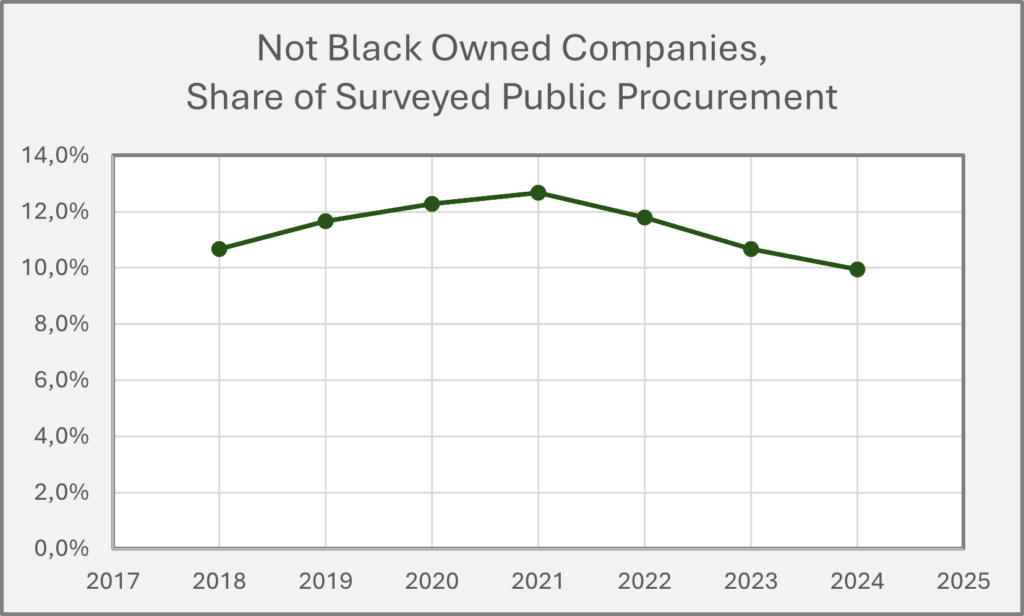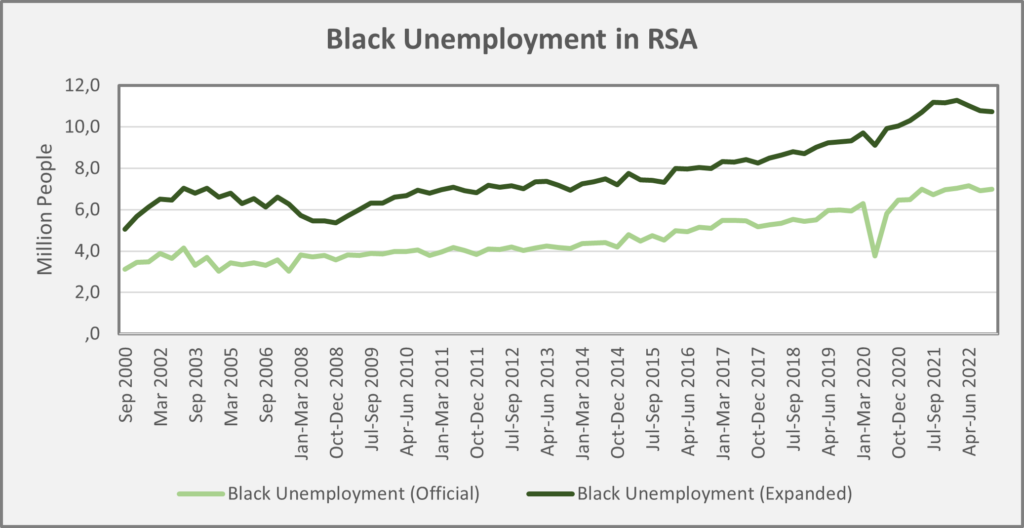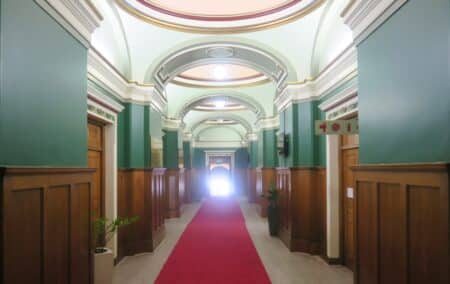The Public Procurement Bill (PPB), which is BEE on steroids covering R1.2 trillion in government spending every year, was debated in the Gauteng Provincial Legislature at the end of February. The ANC is in a race to pass the Bill before the 2024 election dissolves Parliament.
Here is an anecdote to set the scene of the Gauteng Provincial Legislature (GPL) debate about the greatest single threat to our public purse.
Parking spots have been prearranged by the GPL for scheduled presenters. (I’m grateful.) The grand old building is in Joburg CBD. But Google Maps takes me to the wrong side of the GPL building amid a maze of one-ways, veering taxis, and debris. I finally make it to a car park entrance, only to see that it is chained up and padlocked.
A SAPS officer peers through the gate, so I get out of the car and ask him if he can let me in. It should be fine, I say, the GPL has passed my car’s license and personal details to security in advance. Or is there another official entrance, or another parking lot?
The cop says he doesn’t know, ask at reception. At the passenger entrance another SAPS officer is looking dazed, on a chair next to the metal detector. He also doesn’t know where the parking lot is, so I pass through to reception where three ladies are chatting behind the desk, until I arrive. Silence. Sour looks. Who will greet whom first? None of them know where the parking lot is either. They admit they have been working here for years. I guess none of them can afford to drive and resent me for having a car to park. I guess their manager is demotivating. They turn back to chatter, but I do not move.
After a while one of them tells me she thinks she knows a man who might know where the parking lot is, but he walked out five minutes ago. Another receptionist turns sweet and with a big smile, volunteers to go out and look for him in the sunshine.
Surreal. All the ‘I don’t knows’ eventually make it seem like the parking lot does not exist, as if the emails were a fantasy, and I should be embarrassed for asking such a weird question. But that was just an intro to the great big “we don’t know” hole in the middle of South Africa’s public purse, to be debated that day: BEE Premiums.
BEE Premiums
BEE premiums have been paid and unreported pretty much since the beginning. Like a one-way version of the mysterious GPL parking lot, money goes out and no one who works at Treasury seems to know, or be prepared to say, how much is going out of the portal every day, or where it went.
Some things we do know. Total public procurement costs about R1.2 trillion per year, and the portion of that to be spent on BEE premiums is technically capped. Treasury Executive Director Willie Mathebula explained at a recent NCOP Finance Committee briefing that ‘premiums’ are specifically capped at 25% for contracts below R50 million and 11.1% for contracts above that. For context, 11.1% of R1.2 trillion is around R130 billion. My total BEE premium estimate is much lower, but the total estimated waste through corruption in the hidden system is higher.
In a way, Mr Mathebula was reporting the good news. In a corner of the procurement system, BEE Premiums used to be officially uncapped for about five years, starting in 2017, when then-Finance Minister Pravin Gordhan replaced the caps with a racial ‘prequalification’ requirement on some subcontracts. This takes the best price lookup mechanism off the map.
How much went out of the magic portal as a result? No one knows exactly, and (almost) no one asked. The Constitutional Court eventually blocked the Gordhan portal on a technicality, but the PPB brings it back, only bigger, with more layers, and far more mystery, in all contracts.
Mutually hostile blocs
The PPB does this primarily by the same kind of ‘set-asides’ and ‘prequalification’ that Gordhan imposed, but this time there are ‘set-asides’ and ‘prequalification’ for a range of social identity groups that the PPB turns into mutually hostile blocs. If the PPB becomes law in the next few months, contracts will be set aside for ‘women’ of any race, or for ‘black people with disabilities’, or ‘black people who are youth’, or ‘youth’ of any race, or ‘co-operatives which consist of members who are black people’, among others. One designated group gets the ‘set-aside’, and only one.
In addition, ‘prequalification criteria’ are back to limit the pool further on subcontract requirements, through a range of options including ‘black people who are military veterans’ or ‘a small enterprise which is owned by black people within a particular geographical area’.
So, for example, a contract can be ‘set aside’ for black youth, who have to subcontract a minimum amount to black military veterans from a particular district. In practice, this means that any of thousands of procurement offices can decide that only one business is able to ‘compete’.
At that point, not before, a price consideration comes in, and so does the money magic. Why? If only one business competes, then its price will logically be the best price, no matter the price.
Treasury’s way
If I properly understood Treasury’s representative, Mr Willie Mathebula, then this is Treasury’s way to reconcile ‘value-for-money’ with ‘transformation’ so that both are achieved at the same time. The ‘best price’ wins after the ‘set-aside’ and ‘prequalification criteria’ are applied so that ‘value-for-money and transformation are not mutually exclusive’.
Put another way, the single qualifying business will have found the magic money portal, uncapped premiums, abra kadankie.
But how would businesses ever put themselves in the way of such fortune? They could be lucky. They could try magic. Or, though some at the GPL seemed to find this hard to envisage, tenderpreneurs could give bribery a go, circling money from procurement officer to tenderpreneur and back again, contract by contract, with ever greater velocity.
Outside of the legislature, the most difficult thing to get across to most people is the scale of the bribe machine being built. Critics of the ANC-led government unfortunately tend to think corruption has maxed out already in this country, or shrilly act as if it has, which may be one reason the PPB has received so little attention.
True, the Rainbow Republic has suffered the fastest decline in corruption control of any sovereign democracy since 1996 (with the worst drop last year), but half the world’s countries are still worse off, and racing to the bottom requires more innovations. The PPB is the most powerful case in point.
Under the PPB, ‘set-asides’ and ‘prequalification criteria’ are not an option, they are both a ‘must’. No city, no municipality, no small department still showing some pluck will be spared. Every contract will become a bone of contention in the shadows, to be fought for on the lines of race, gender, age, and military veteran status, etc., with ‘value-for-money’ as lost as I was outside the GPL.
Exchange with Treasury
Here are some key points that I conveyed at the GPL (although this first graph has been slightly altered since then to correct an error).

This data was recently released by Treasury at the behest of the NCOP Finance Committee, through Chairperson Yunus Carrim (ANC). It shows that ‘not black owned’ companies received around 10% of surveyed public procurement. The PPB is designed to bring white companies to heel, from a baseline of 10%.

This data was shared with us by email from Stats SA. It shows black unemployment over time. During the prime BEE era, starting around 2008, black unemployment roughly doubled to 10.7 million on the expanded definition. This is not ‘transformation’. This is deformation.
Unemployment and poverty are a scourge for all races. Over a quarter of children are stunted due to malnutrition. The black unemployment figures are important to show the GPL, because the point of the PPB is supposed to be to help most black people specifically. This is irrational, since the current system does the opposite.
‘R584,915,224,031.81’. That is the value of payments to BEE Level 1 companies out of the last surveyed R1.22 trillion in spending, according to the recently released Treasury data.
‘R587.66 billion’. That is the value of payments to ‘black owned companies’, according to the recently released Treasury data, out of R1.22 trillion. Both come to about 48%.
R6.199 trillion. That is the value of all public procurement from the financial year ending in 2018 up to September 2023, which is most of the surveyed period in Treasury’s race procurement mini-report. The implication is, using the 48% ratio, that R2.966 trillion was spent on ‘black owned companies’ in that period.
Furthermore, on a Treasury analysis of R2.659 trillion in private annual turnover on JSE listed companies, the largest particular share analysed was BEE Level 1 companies, at 21%. According to Treasury, 69% of that turnover occurred ‘within [BEE] levels 1 to 4’, which are the highest BEE point-scorers.
The same Treasury that provided this data after a tongue-lashing in the NCOP would have you believe that ‘black business’ making trillions cannot survive unless the 25% cap is replaced by an even bigger BEE Premium allowance. It is so insulting to everyone, starting with upstanding black businesses. Worse than insulting, the PPB dooms more children to hunger.
Why? Because when the magic money portal gets bigger and even harder to find, more cash spins off into the golden helix of upward tender-mobility, to the benefit of a little ‘rainbow’ cartel that includes crooks of all races, while the majority, including me and you, however you look, whatever your age, or gender, gets less of anything useful. The unemployed, and stunted children who depend on them, take that knock hardest.
7%. That is the value of a BEE Premium the City of Cape Town found itself paying on traffic light tech. If the average BEE Premium was 7% nationwide then BEE Premiums would be bigger than all child grants combined.
Treasury’s response to this was so unfortunate that I will not report it now. I have written to get clarity on its answer. Even if it fails to answer, Treasury is due to report back on the IRR’s − and other contributors’ − submissions next week at the NCOP.
Treasury could begin the turnaround tomorrow. All it needs to do is send out a directive, using a well-established format, urging all organs of state to request exemptions from BEE for all procurement so that South Africa can be transformed via ‘value-for-money’, rather than in opposition to it. Who could doubt that black businesses would do even better, as would practically everyone, in such a system?
Unlike the parking lot, this route is not hidden. It is bright on the map. It is global best practice. But Treasury under this government, or the next, will not find the first step to success, disciplined spending, unless more people pull finger to point it out.
[Image: Gabriel Crouse, corridor in the Gauteng Provincial Legislature]
If you like what you have just read, support the Daily Friend

